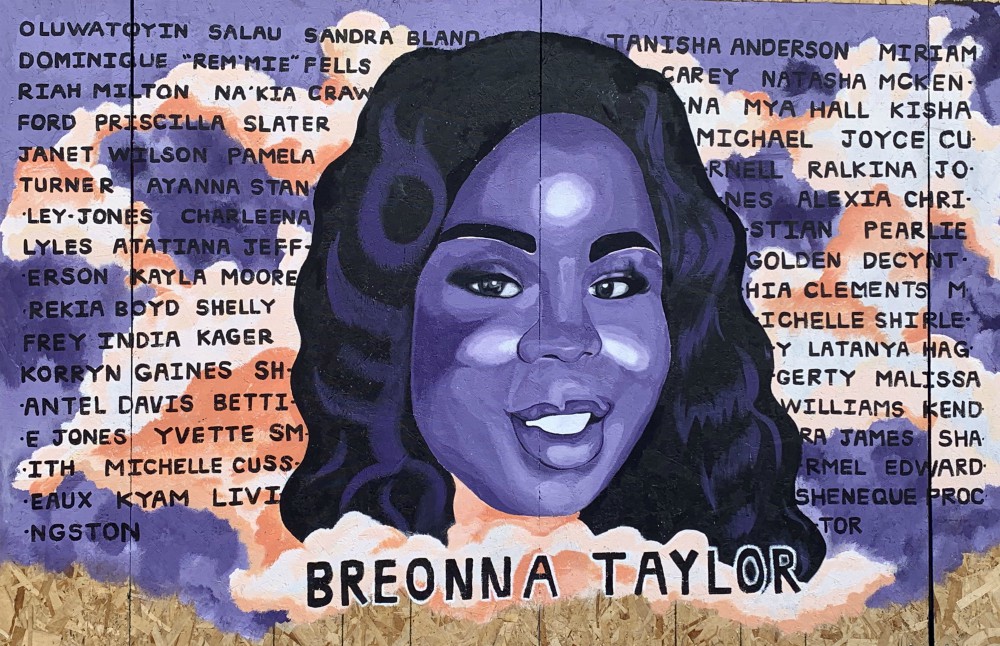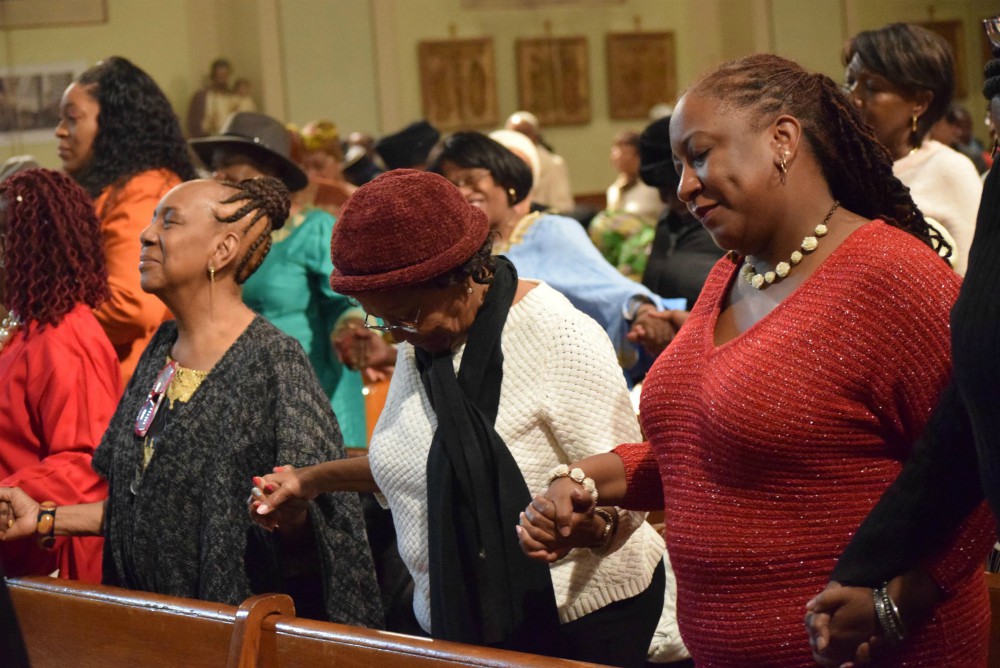
A mural in Chicago on the corner of Sheridan and Wilson depicts the names and images of Black women who were victims of police violence. (Photo by Tina Carter)
It has come to the attention of some that Black Catholic women are not fully represented in the public dialogue of current events, including the COVID-19 pandemic, the ongoing slaughter of unarmed Black family, and the national protest movements staging across the nation. I am not altogether convinced that the Catholic press is interested in the perspectives of Black Catholic women except as a last resource in situations of racial crisis when dominant culture wisdom fails to satisfy. In a business world in which market share and the bottom line are principal considerations, it may not be prudent in a worldly sense to cover in-depth a demographic that represents 3% of the national Catholic population.
But, like other Christian disciples, we are struggling to make sense of the senselessness that is the national present-day reality. We are particularly grateful for the God-given spiritual and cultural gifts that seem to get us through the worst horrors, abuse and pain with our humanity intact. We are devastated, mad (not just angry) and bewildered that the nation's original sin of anti-Black racism still runs so rampant through U.S. society to the detriment of all its citizens.
Sadly, we watch the leadership of our U.S. Catholic Church struggle to respond to the current state of affairs with moral authority, Gospel value clarity and a consistent praxis that reflects its own teachings.
So, the Black Catholic women I know have been busy reflecting, praying and living their Black lives as usual in perpetual resistance to the status quo maintained by white supremacy. Only now we are on higher alert as the routine danger of being Black more starkly presents in the disparity of coronavirus statistics and the almost weekly killings of unarmed people who are us.
In our many and diverse responses to the signs of the times, Black Catholic women are very clear that Black lives matter. Some of us have taken to the streets to protest; others are responding creatively — in word, music, the arts, mask-making. We are busy raising children, checking the wellness of spouses and friends, caring for elders. Some have responsibility for multiple generations of Black lives in an age when support and resources — health care, education, internet access, paycheck protection, rule of law — are reserved for those who can already well afford them.
Black Catholic women are essential workers — receiving low pay and regard, taking high personal risks. Some of us are teaching or pursuing an education, trying to make the most of disruptions in routine and remote learning processes that put many struggling learners at even greater disadvantage. Some Black Catholic women are in a career that they love, trying to hold on as they discover that the boot on their neck belongs to a sister.
In terms of church life, Catholic social teaching brings Scripture, church doctrine and tradition to bear on the contemporary challenges of living together as children of God, like the challenges described here in the context of the lives of Black women. However, few Sunday homilies or letters from the pastor, even in recent weeks, treat social justice issues in light of where the church says it stands.
The ability to attend livestreamed Mass is a blessing, given the pandemic. However, we grieve the suspension of Black Catholic worship traditions as more parishes invite the faithful to attend Mass in person. Attempts to control the coronavirus in church settings prohibit congregational singing, severely limit personal interactions among the assembly and demand stringent cleanups after the holy people of God have left the building.
Advertisement
The starkness of the coronavirus-era eucharistic liturgy does not sit well with our spirits at a time when Black Catholic women are tussling with pastoral leaders and diocesan officials to keep Black Catholic schools open and church pews full. The loss of established Black Catholic institutions is a tragedy of major proportions for the evangelizing mission of local communities of faith and the church at-large.
Although relatively small in numbers, Black Catholics have been faithful believers with stubborn roots in the church that run deep. As we watch the nation in protest try to come to terms with the innate racial injustice of its socioeconomic systems, policies and culture, it occurs to me that, certainly since the 1962-65 Second Vatican Council, Black Catholic women in various ministries have resisted and openly protested the systemic injustice of the U.S. Catholic Church. Since its establishment in the New World, institutionalized racism has resulted in ecclesial decisions and practices that privilege European American Catholics and cultures.
While public talk is absolutely necessary, Black Catholic women (and men) understand the greater good of representing the truth of the Gospel of Jesus Christ in word, action and attitude.

Women pray during Mass Nov. 17, 2019, at St. Therese of Lisieux Church in Brooklyn, New York, in celebration of November as National Black Catholic History Month. (CNS/The Tablet/Andrew Pugliese)
My own response to this season of COVID-19, police violence and Black Lives Matter protests is the Institute for Black Catholic Studies, a school of ministry that ordinarily meets each summer on the campus of Xavier University of Louisiana. The institute's purpose is to form lay women and men, religious and clergy for more meaningful and effective ministry, and to foster new/renewed leadership among Black Catholics and others who minister with Black communities and the church at large.
Due to the coronavirus, the institute community will gather for this, its 41st summer session, online. As a virtual body of Christ, may the theological and pastoral work that we do together — faculty, staff and students — send us forth to embody good news of justice, peace and salvation in times such as these.
[Kathleen Dorsey Bellow is the director of the Institute for Black Catholic Studies at Xavier University of Louisiana in New Orleans.]






